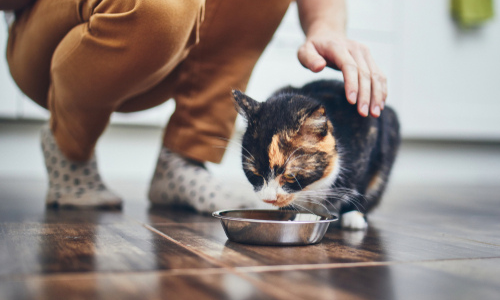
How to Help Your Cat Maintain a Healthy Weight
Overweight cats look cute in cartoons and memes, but feline obesity is no laughing matter. Excess weight strains your pet's heart and joints and increases the risk of diabetes, arthritis, urinary tract problems, cancer, and skin conditions.
Is Your Cat Overweight?
It's difficult to determine the ideal weight for your cat if you look at numbers alone. Although experts say cats should weigh between 7 to 12 pounds, some cats may be overweight or obese at 12 pounds, while others are sleek and slim.
A quick examination will help you evaluate your pet's weight. Run your hands over your pet's body. Can you feel the ribs or are they hidden under a thick layer of fat? The ribs are normally covered by a small amount of fat but can be felt easily if your cat isn't overweight. If you can't feel your pet's ribs, it may be time to make some changes to your pet's diet.
Take a look at your cat's waist from above while he or she is standing. You should see a slight indentation between the hips and back legs. A round appearance with no noticeable waist may mean that your cat is overweight or obese.
What You Can Do to Prevent Obesity
These steps can help your cat avoid the dangerous consequences of obesity:
- Offer Food Appropriate for Your Cat's Age. Your pet's nutritional needs change throughout his or her lifetime. Growing kittens require more frequent feedings and need extra nutrients in their food. Continuing to feed cats food intended for kittens past one year of age can lead to weight gain. Food changes may also be needed as your pet ages. Less active, older cats may benefit from lower-calorie senior food. Your pet's veterinarian can help you find a type of cat food that meets all of your pet's nutritional requirements.
- Pay Attention to Portion Sizes. Do you throw a handful of food in your cat's dish every time you notice it's empty? Overfeeding is a common cause of weight issues. In fact, your pet may only need one-third to one-half cup of food per day, depending on the food's calorie count. Take a look at the cat calorie calculator offered on the Pet Nutrition Alliance website to determine how many daily calories your cat really needs.
- Limit Treats. Too many treats can also affect your pet's weight and may be a factor in obesity. Treats should account for no more than 10 percent of your pet's daily caloric intake, according to the Cummings Veterinary Medical Center at Tufts University.
- Help Your Cat Stay Active. Cats need regular exercise to maintain their ideal weight and keep their hearts, muscles, and joints strong and healthy. Your cat may enjoy batting at the toy at the end of a kitty fishing rod, chasing a laser beam, or fetching a small toy. Interactive treat mazes offer physical and mental stimulation for your cat (as long as you pay attention to the calorie count of the treats), while battery-powered mice give your pet a fun workout. If you're handy, a homemade maze or climbing tower can keep your pet busy for hours.
- Visit the Vet. It's easy to overlook a slight weight gain in your cat. Unfortunately, even an extra pound may increase your pet's risk of developing health problems. During annual wellness exams, your pet's veterinarian evaluates your cat's weight and body condition and can offer a few healthy eating tips if your favorite feline has started to gain weight.
Approximately 60 percent of cats are obese, according to the American Association for Pet Obesity Prevention. Could your cat be one of them? If you're concerned about your cat's weight, contact our office to schedule an appointment.
Sources:
Pet Nutrition Alliance: Calorie Calculator for Cats
Association for Pet Obesity Prevention: 2018 Pet Obesity Survey Results
Cornell Feline Health Center: How Often Should You Feed Your Cat?
Catster: Do You Have an Obese Cat? Here’s How to Tell, 3/6/18

